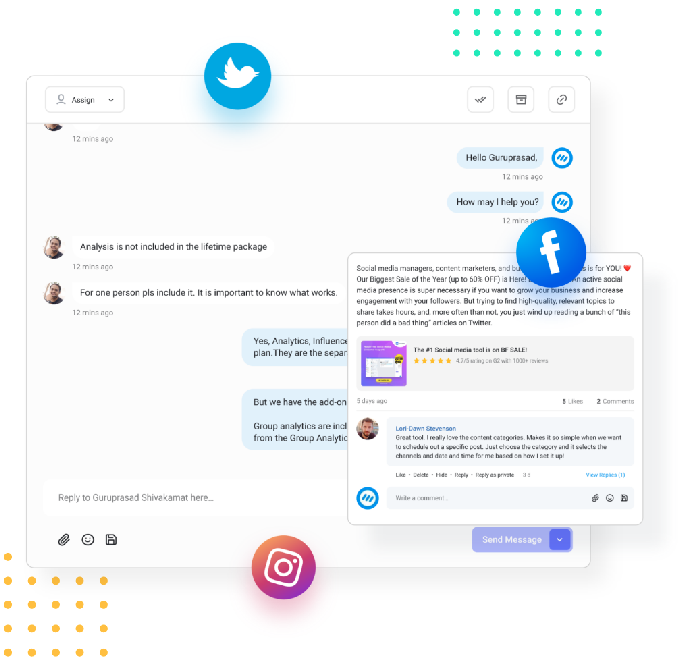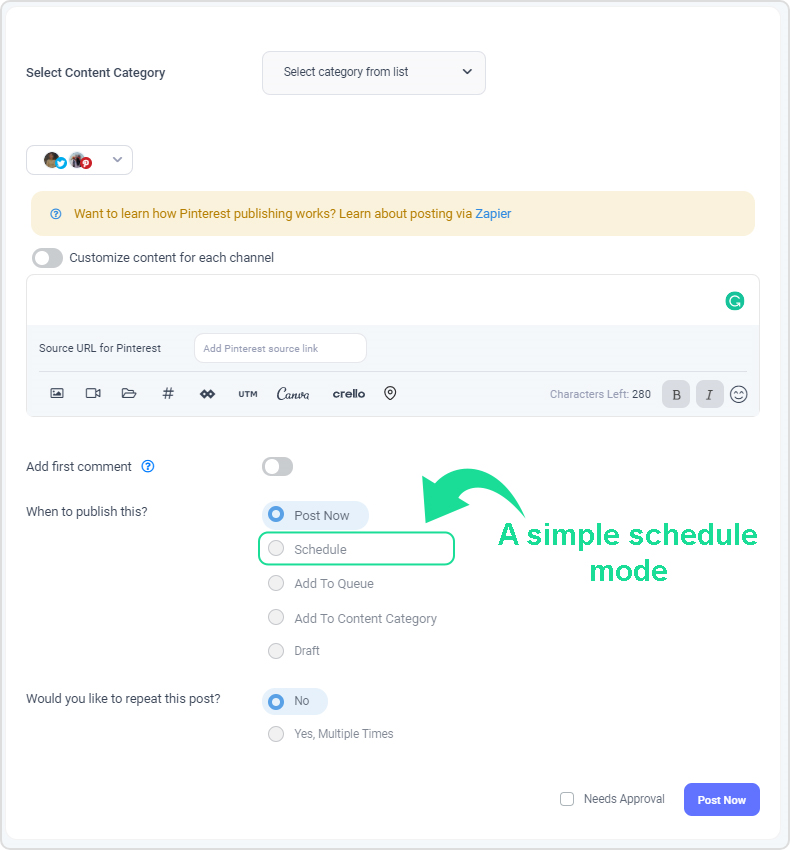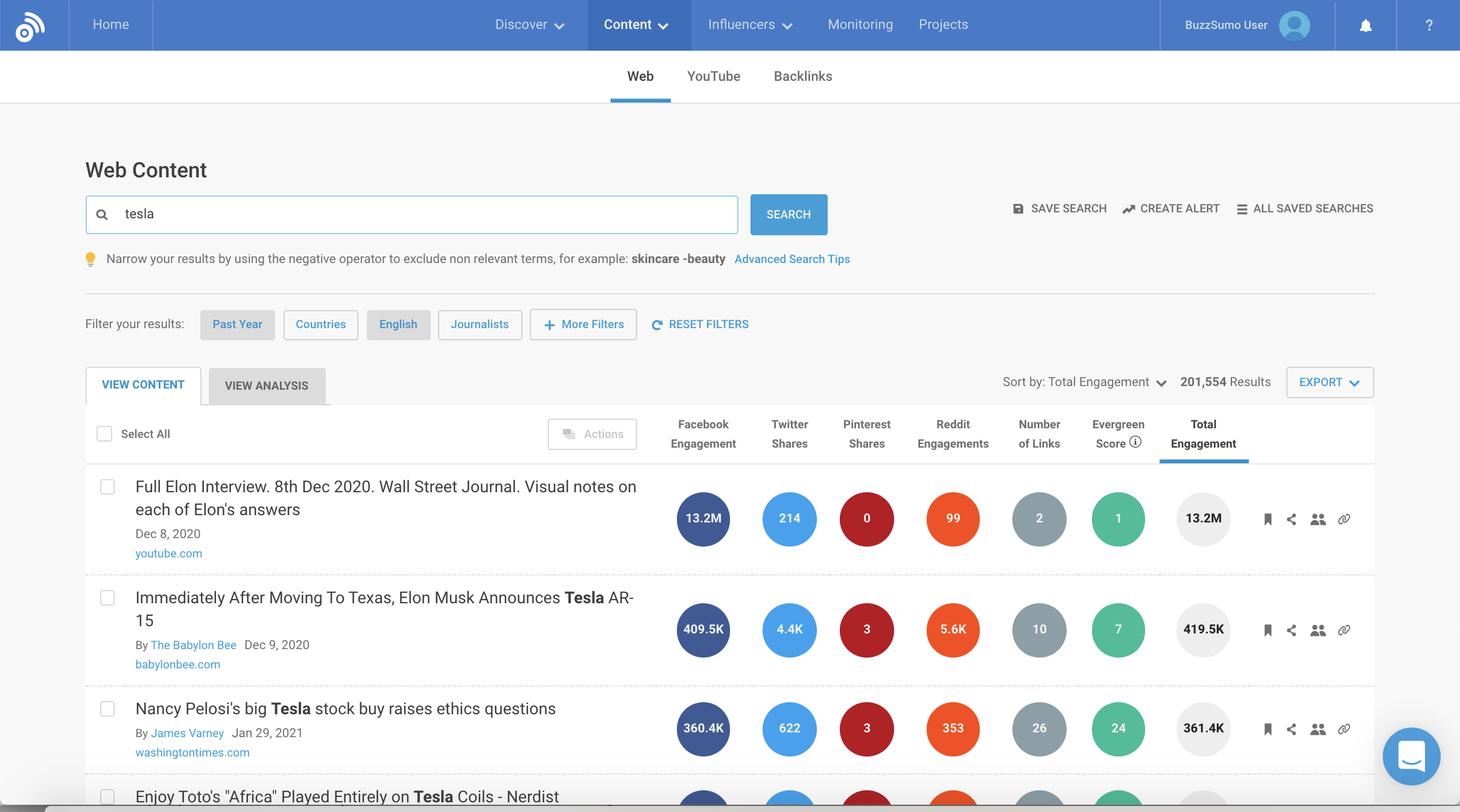Neck-deep into social media challenges? Or, seeing them pop up as you decide which channels to use, what content to post, how to engage your target audience, and so on?
Either way, social media marketing challenges are real. And, you’ll find one blocking your way to success from the start of your journey.
So what problems should you anticipate, and how do you overcome these issues in social media marketing? Let’s answer all this and more for you in this guide as we dig into eight social media challenges and solutions to each of the problems we discuss.
Read on.
The 8 Biggest Social Media Challenges to Be Aware of (And How to Solve them)
Here’s a rundown of the problems, followed by the details:
-
-
-
- Identifying the Right Platforms
- Understanding the Target Audience
- Defining Goals and KPIs
- Decreasing Organic Reach and Engagement
- Finding Engaging Content Ideas
- Creating The Right Content For The Right Platform
- Building Trust and Transparency
- Integrating Social Media With Other Digital Marketing Channels
-
-
1. Identifying the Right Platforms
Not only is this a concern for those shortlisting social channels to join for their new business, but also for those auditing their social presence.
The idea is simple: you don’t want to spread yourself too thin by joining all social channels. Instead, aim to establish an active, engaging presence on 2-3 social platforms used most by your target buyers.
So how do you identify these platforms? The following will help:
-
- Understand your audience and who uses which social channel
First things first, revisit your buyer profile for a quick recap of who your target audience is. Once you know whom you’re targeting, research each social channel’s user profile.
For example, if you’re marketing to Gen Z on social media, you’ll find that they use Instagram, Snapchat, and TikTok the most. Similarly, if you’re selling to baby boomers, Facebook is the right platform to get to them.
-
- Interview your target buyers
These could be your customers or people who match your buyer profile’s description. Hop on a call with them or survey a group to learn their social channels preferences.
This will help you identify not only which platforms are right for you but also how your audience uses them – more on this in a bit.
-
- Study which platforms your audience is using
Finally, take on some competitor analysis. Simply Google your niche, and industry-leading names will show. From there, visit their site to find out which social channels they’re using.
And while you’re at it, also study how your competitors are using social. Doing so will help you design your social media content plan and publishing schedule. It’ll also give you ideas for engaging your audience and content ideas – another leading challenge of social media.

Analyze, Understand, and Improve Your Social Strategy
Stack your key social metrics against those of your competitors and make targeted steps towards social media success.
14 days free trial – no credit card required2. Understanding the Target Audience
Once you’ve settled on which platforms are right for you, the next obvious challenge is understanding each platform’s unique audience.
The best way to learn their behavior on social media? Here are three:
-
- Interview your target audience
When asking your audience about the channels you use, ask them about how they use them too. Inquire if they follow and interact with brands on those channels. If they do, how do they prefer to interact, and what content do they ideally like to see.
-
- Observe your target on social media
This kind of hands-on research gives you an in-depth understanding of your target. Identify power users or target users who actively engage with brands and study their actions.
Not sure where to find such people? Go to your competitors’ social channels or social channels of businesses that cater to the same audience as you do. From their comments section, find names of people whom you see repeatedly interacting with the brand.
-
- See what others like you are doing
We recommend you study this in your competitor analysis. Other than that, study brands that aren’t your direct competitors but serve the same audience.
Observe the content they create, how they engage with their audience, and the social media marketing tactics they leverage.
3. Defining Goals and KPIs
This is easier said than done. A good start, however, is to make notes of your objectives from social media. Start with asking yourself: what is it that you want to achieve.
It’s important you don’t set lofty goals here. That’s only going to hurt your social marketing plans.
So start small – identify 1-2 goals, set a timeline for them, and decide on strategies you’ll follow to achieve them. This way, you’ll be setting SMART goals.
One thing to remember, though: your goals are going to be based on where you are in your business and for how long you’ve been using social media.
For instance, if you’re starting out and only joining social, you’ll want to focus on brand awareness as your primary goal. If you’ve already positioned yourself in the market and want to up your social media game, you’ll want to target engagement as your goal.
Based on the goals you choose, set your Key Performance Indicators (KPIs). These are metrics you want to keep tabs on to track your progress.
So, for example, for a goal of brand awareness, track reach and impressions as your main KPIs. For engagement, study comments, reposts/retweets, likes, and mentions.
Are you using social media for customer service? Look at metrics like the average time it takes your team to get back to queries.

Master Social Customer Care and Support
Manage your brand’s social presence by monitoring and managing incoming messages and comments across your social networks.
14 days free trial – no credit card required4. Decreasing Organic Reach and Engagement
This is true for some, not all social platforms. Regardless of which channels, though, it’s among common social media challenges that businesses face.
Here are two ways to keep your reach and engagement up:
-
- Post audience-relevant content consistently
There are two major things to focus on here. One, share audience-engaging content because people will always keep returning to you when your content is good.
And, two, maintain a consistent publishing schedule based on when your audience is active on social media. This helps you set expectations and tunes social media algorithms in your favor.
Here’s more on the best times to post on social media.
Are you having trouble maintaining your publishing schedule? Create content in advance. Then, use a social media tool like ContentStudio to schedule your content to go out at pre-defined times.
All you’ve to do is to log into ContentStudio, head to the Publish section, and choose Composer from there.
Select your social media channels from the next page and start writing your post. You can add a URL, an image, and some related hashtags too.
Once done, choose a scheduling option and pick the time and date the post will go out. Finally, hit publish, and you’re all set. Here are three more ways to schedule content with ContentStudio.

Using a scheduler to post content helps you maintain your publishing frequency and gives you time to engage with your audience. It also means if your audience is in another time zone than yourself, you can still reach out to them when they’re active.
- Engage with them consistently
Engagement begets engagement. It also tells the algorithms that you’re spending time on respective channels, which improves your organic reach.
In action, this means you set time up for social media engagement in your calendar. In fact, if you’re using a social media scheduler as suggested above, get rid of the set-it-and-forget-it mindset.
Instead, use the time you save to engage with your audience.
No one should have to put up with that many Cheetos, let us take care of them for you. https://t.co/yOIWPu9s0w
— Doritos (@Doritos) December 16, 2021
So what’s the right way to engage with your audience? Try this:
✔ Get back to their comments on your content and brand mentions at your earliest.
✔ Repost or retweet content your audience shares that are relevant to your brand.
✔ Always thank your audience for posting product reviews and share them too.
The more you focus on providing value and making your audience feel valued, the better your engagement and reach will get. In fact, people always keep coming back to such a community approach.
5. Finding Engaging Content Ideas
Finding ideas for content to post is another one of the issues in social media marketing that users regularly struggle with.
As you talk to your target audience, you can ask them to share their pain points with you. Specifically, ask them about common questions they’ve or things they struggle with.
For instance, if you’re a productivity app, you can ask them about their work routines and what struggles they face. This should give you good ideas for content to create.
Other than this, try the following:
-
- Research on Q&A platforms like Quora and Reddit
Plus, any communities that you’re a part of, provided the community features people from your target audience.
Look for questions they are asking to create content that answers these questions. You can also source meme ideas and funny jokes from these platforms.
-
- Keep an eye on what’s trending on social and in your industry
You’ll also want to keep tabs on brand and audience-relevant hashtags that trend. This way, you can create up-to-date content that engages followers.
THINGS JÜRGEN CAN BE AFTER #GBBO:
1. Owner of Germany’s finest bakery
2. Winnie the Pooh lookalike
3. Our new best friend
4. Creator of a new range of eyebrow gels
5. Santa
6. Literally anything he wants, we’ll support him #GBBOFinal— innocent drinks (@innocent) November 23, 2021
-
- Source ideas from industry influencers
Find out the influencers your audience is following and study the topics they’re sharing for content ideas. The best part? The traction influencers’ content gains give you an idea of how much potential the idea has for gaining your audience’s attention.
-
- Repurpose content
Not all content you create has to be new content. Instead, recycling content for social media also helps. Have a blog post or explainer video that gained a good response? Tweak to a particular social platform’s requirements and post.
-
- Use a content Ideas tool
ContentStudio’s free tool contentideas.io is an excellent platform for going through trending content across the web on any topic.
6. Creating The Right Content For The Right Platform
While finding the right content ideas is one thing, filtering those ideas for the best ideas for the platform you’re using is another.
So what helps with this social media challenge? The following two things:
-
- Spend time down in the trenches
The only surefire way to understand any platform’s content requirements is to spend time using it.
Look for what content formats are creating and what topics they’re talking about. It’s only after I spent time on LinkedIn that I learned that the platform’s audience loves consuming inspiring stories and industry-relevant jokes.
- Enlist help from the right tools’
Buzzsumo can help with this. When you type in a keyword, the software pulls out the engagement it’s getting on social media. This gives a solid idea of what ideas attract engagement on specific channels.

At the same time, when curating content for your social channels, use ContentStudio to discover trending content pieces to share.
Simply add your target audience’s interests to the tool, and it’d return with a load of relevant posts. From there, handpick posts that align with your brand and will most likely resonate with your audience.
You can also use the Query Builder to create a custom topic feed. Here, include and exclude keywords to find the best, audience-engaging curated pieces.
7. Building Trust and Transparency
Another struggle on this list of social media challenges: building credibility. After all, it’s only when people trust your brand that they’d buy from you – even recommend you to others.
So here’s how to build a trustworthy name for yourself in your space:
-
- Share social proof
This could include anything from customer reviews to third-party ratings. Post them regularly on your social platforms to show followers others like them trust your product/service.
View this post on Instagram
If someone shares positive words about your business on social, be sure to repost the content. And save the content too. For example, create a Story Highlight on Instagram that features all your testimonials.
Have a SaaS tool or run an agency? Don’t forget to share takeaways from and links to case studies you create. If you’re interviewing your clients or users, make sure you create a bite-sized video clip on the interview sharing a short customer testimonial with your followers.
-
- Run UGC campaigns
UGC stands for User Generated Content. UGC campaigns are campaigns that encourage your customers to create content for you. So you could create a custom hashtag and prompt people to share pictures of your product, for example.
Case in point: Starbucks engaged with their customer as they shared a product picture.

Then, they posted it on their account too:
View this post on Instagram
-
- Get your head/lead or an entire team to interact on social
This is helpful for creating transparency. It works because it shows the faces behind your brand and people working behind the scenes, giving your social account a human touch. Naturally, this helps you gain followers’ trust.
-
- Share internal updates and milestones
Talk about how well you’ve done in the quarter or what you’ve learned from mistakes you’ve made in the past. Sharing stories like these are not only engaging but also gives people an inside scoop into your business.
View this post on Instagram
8. Integrating Social Media With Other Digital Marketing Channels
Another one of the leading issues in social media marketing is figuring out how to convert social traffic.
For example, if you want to drive followers on social to your newsletter or Discord channel, how do you do that? Again, we’ve not one but two solutions to the problem.
-
- Take a community-building approach that offers value
We’ve talked about this before, but it deserves mention here as well. Make your followers feel like they’re a part of a family.
This requires you to take a value-first approach by investing in your community members’ success. Meaning: don’t be salesy.
SEMrush, for instance, used to host a Twitter chat that brought together marketers. Not only did that help them grow engagement, but it helped marketers connect with other marketers. This is how they offered value to their community.
They also celebrated their community members’ success. For example, by sharing blog posts, they had written where they mentioned their tool. The result? An engaged community that they easily convert into blog traffic.
-
- Give people a platform-specific incentive
For instance, send out a message that gives out your social family a first-time purchase discount when they sign up for your newsletter.
Ready to Beat These Leading Social Media Challenges?
Now that you know which social media marketing tactics can help you overcome these challenges, we’re hoping you’re all set to up your social game.
Remember, the biggest solution to all your social media marketing problems is knowing whom you’re talking to.
The better you know your audience, the better your content is going to resonate with them. At the same time, you’ll have a stronger grip on what content format they prefer on different platforms and how they prefer to interact with brands.
Other than that, taking a value-first approach is always going to help you – no matter the issue you’re struggling with on social. The reason? The more value you offer – in terms of the content you create, how fast you get back to queries, and how you engage with followers – the more people will interact with you.
Don’t forget; you’ve to be doing whatever it takes to gain your audience’s trust. So keep sharing company updates, customer ratings, testimonials, and UGC content.
And, finally, don’t forget to use the right tools to overcome the challenges of social media.
So what are you waiting for? Sign up for ContentStudio for free today to maintain a consistent publishing frequency and engage with your audience better.
